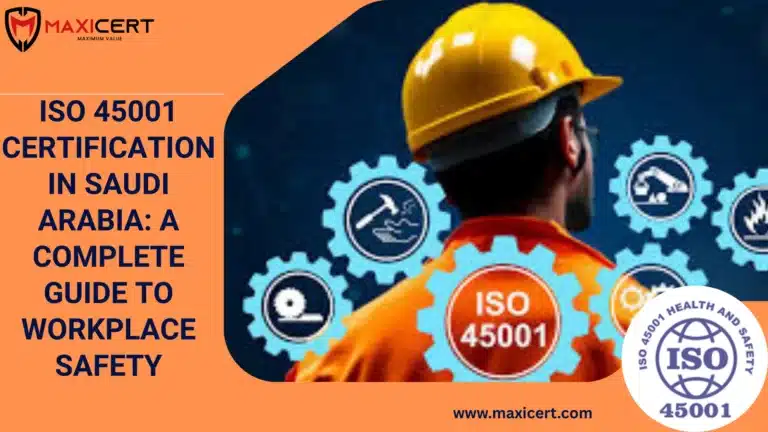ISO 45001 Certification in Saudi Arabia: A Complete Guide to Workplace Safety

Introduction
Workplace injuries are more than numbers—they’re tangible losses that affect people, reputations, and bottom lines. In Saudi Arabia, where construction, oil & gas, and logistics industries are expanding at a rapid pace, protecting workers is not only an ethical imperative—it’s a strategic one.
It’s for that reason that so many organizations are adopting ISO 45001 Certification. This global standard enables companies to establish a robust Occupational Health and Safety Management System (OHSMS) that minimizes risk, enhances compliance, and generates continuous improvement.
This guide tells you everything you need to know about ISO 45001 in the Saudi context—from the scope of the standard through how the certification process works, why it matters, and how to begin.
What is ISO 45001 Certification?
ISO 45001 is an international standard for Occupational Health and Safety Management Systems (OHSMS). It supplants the previous OHSAS 18001 and is meant to assist organizations in risk management, protecting employees, and improving workplace safety.
The standard is applicable to any-sized organization across any industry. Whether oil drilling or manufacturing, ISO 45001 assists you in building a proactive safety culture.
Request A Free Quote
Why ISO 45001 Certification Matters in Saudi Arabia
Saudi Arabia has high-risk sectors. From heavy equipment on building sites to risky operations in oilfields, safety gaps can be disastrous.
Here’s why ISO 45001 is significant in Saudi Arabia:
- Alignment with Vision 2030: Saudi Arabia’s nationwide vision encompasses sustainable industry development and employee well-being.
- Legal Compliance: The Ministry of Human Resources and Social Development (HRSD) advocates for stringent safety policies.
- Tender Qualification: Government and large-scale projects mostly demand certified health and safety practices.
Key Requirements of ISO 45001 Standard
Context of the Organization
- Internal and external safety risks understanding
- Meeting legal and regulatory requirements
Leadership & Worker Participation
- Safety agenda leadership is the responsibility of management
- Employee engagement is the secret to successful risk control
Hazard Identification and Risk Assessment
- Identifying safety hazards before injury
- Adopting systematic control actions
Emergency Preparedness and Response
- Establishing evacuation, rescue, and emergency strategies
- Training employees for unforeseen situations
Performance Assessment and Enhancement
- Internal review and audits
- Continuously improving the system
ISO 45001 Certification Process in Saudi Arabia
Step 1: Gap Assessment
- Find out where your organization is now and what needs improvement.
Step 2: System Development
- Write policies, create procedures, and define responsibilities.
Step 3: Implementation
- Train employees and embed safety culture in day-to-day activities.
Step 4: Internal Audit & Management Review
- Assess the performance and preparedness of the system prior to going external.
Step 5: External Audit & Certification
- Get certified by an accredited certification organization to become ISO 45001 compliant.
Benefits of ISO 45001 Certification
- Decreases workplace incidents and downtime
- Boosts employee confidence and retention
- Keeps up with legal requirements more effectively
- Frees up access to government contracts and international customers
- Increases reputation and brand trustworthiness
ISO 45001 vs OHSAS 18001: What's Different?
- Risk-Based Thinking: More emphasis on prevention by ISO 45001
- Top Management Accountability: More leadership responsibilities
- Compatibility with Other Standards: Can be easily integrated with ISO 9001 and 14001
- Emphasis on Worker Participation: Workers are engaged participants
Who Needs ISO 45001 in Saudi Arabia?
High-risk industries or large-scale workforces can benefit the most:
- Oil & Gas
- Construction & Engineering
- Logistics & Warehousing
- Mining
- Manufacturing
Even small businesses can benefit from improved safety culture, lower risks, and enhanced client confidence.
Selecting the Correct ISO 45001 Consultant in Saudi Arabia
What to Look For:
- Experience with Saudi regulations
- Competitive and clear pricing
- Full certification support from end to end
Why Maxicert?
We’ve assisted organizations throughout Saudi Arabia in achieving ISO 45001 rapidly and efficiently. From the original gap analysis to complete certification, our consultants ensure compliance, audit-readiness, and peace of mind every step of the way.
Learn more about our ISO certification services in Saudi Arabia
Legal & Regulatory Assistance for ISO 45001 in Saudi Arabia
Following safety legislation is no longer a choice. The Ministry of HRSD and GOSI (General Organization for Social Insurance) have stringent safety enforcement regulations.
With ISO 45001, your company:
- Meets national occupational health and safety standards
- Reduces penalties and closures
- Gains regulators’, insurers’, and clients’ trust
Conclusion
Safety is not about being compliant—it’s about building a work culture where your staff feel safe, valued, and engaged. ISO 45001 facilitates you to make it happen, step by step, process by process.
Ready to Get ISO 45001 Certified in Saudi Arabia?
Let Maxicert eliminate the hassle of your ISO journey.
Get in touch with us now or discover our services to begin with ISO 45001 certification today.

Get In Touch

Get In Touch

Get In Touch
Need A Free Estimate?
Get a free consultation and Checklist to get certified for ISO , HALAL, CE Mark Certification.
FAQ
Is ISO 45001 mandatory in Saudi Arabia?
Not for everyone, but frequently required in large contracts or high-risk industries.
How long does it take to become certified?
2 to 6 months, depending on your system’s preparedness.
What are the primary documents needed?
Policy manuals, risk assessments, emergency procedures, training records.
How much will ISO 45001 certification cost?
It depends on company size and scope, but it’s an investment well worth it.
Who can award an ISO 45001 certificate?
Only accredited certification bodies, authorized under ISO standards.



